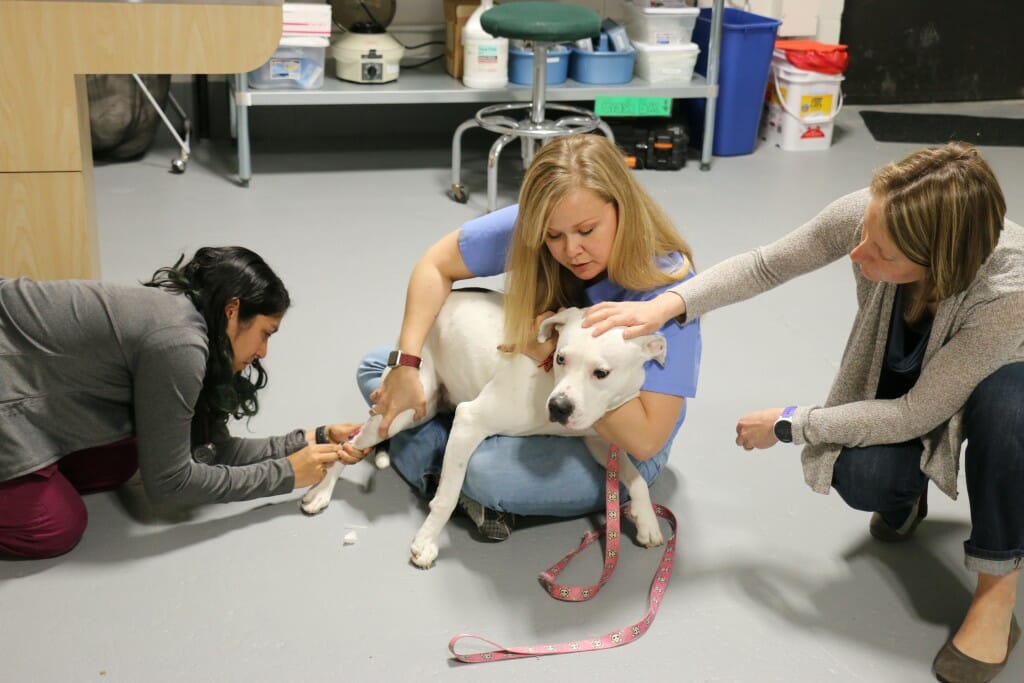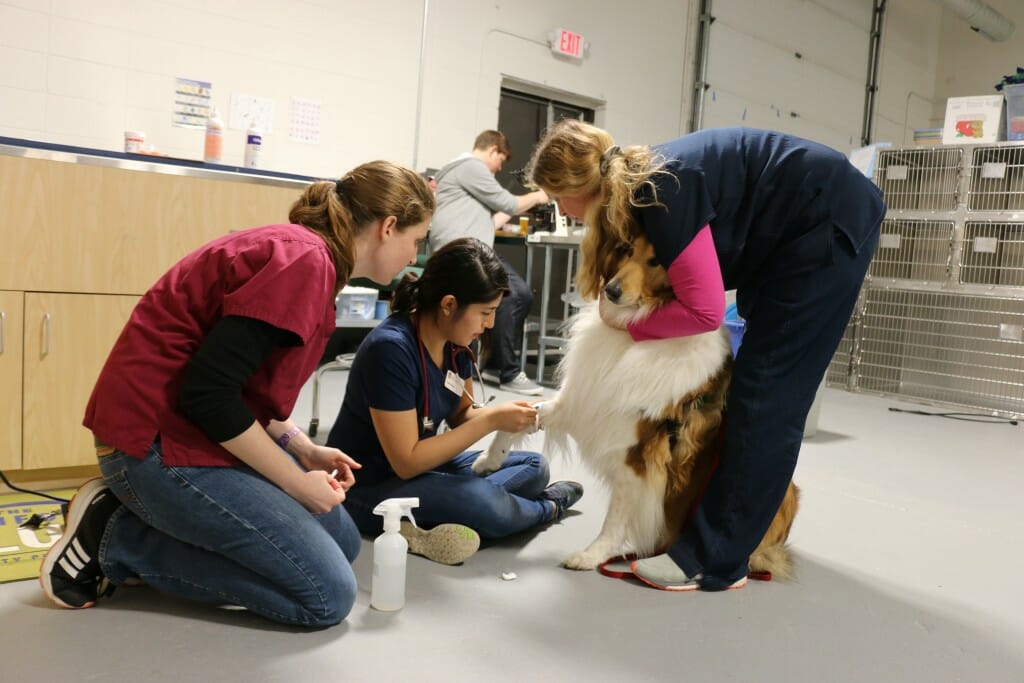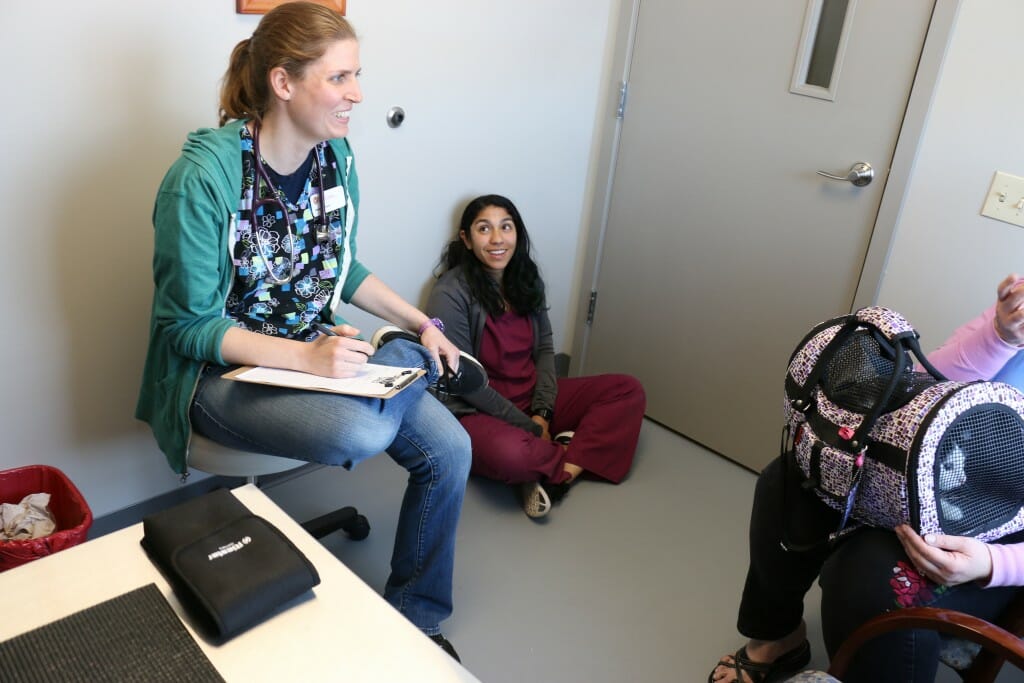Veterinary clinic for homeless pet owners meets growing demand
From February through June, we will highlight the ways that UW–Madison powers the state’s economy through research and innovation, educates the next generation and reaches out to Wisconsinites to improve their lives. March’s theme is Health. Watch for more at #CantStopABadger and #UWimpact on social media. Your support can help us continue this work.
The Wisconsin Companion Animal Resources, Education, and Social Services (WisCARES) clinic has been experiencing an influx of new clientele as a result of financial hardship caused by the COVID-19 pandemic.
WisCARES is a partnership between the UW schools of veterinary medicine, social work and pharmacy that provides veterinary medical care and social services to individuals in Dane County who are low-income or who are experiencing homelessness.
Since its founding in 2014, WisCARES has grown into a full-fledged veterinary practice and can provide anything from vaccines to chronic disease management and surgeries. Additionally, they offer a pet food and supply pantry, animal foster care assistance, and boarding to qualifying clients.
“The combination of the veterinary clinic along with the social services aspects are what makes WisCARES really unique,” says Elizabeth Alvarez, veterinarian and curriculum director.
Over the past year, WisCARES has seen an increased number of new clients coming to their clinic seeking veterinary care and support services.
“We are finding that especially in the last six to nine months, we have seen an increase in our number of clients, many of whom may not have needed a service like WisCARES prior to COVID,” Alvarez said.
According to a study by the Pew Research Center, 25 percent of adults in the United States have lost a job due to the coronavirus pandemic. Additionally, the study found, individuals with lower income have been the most affected by job loss or pay cuts because of COVID-19.
The WisCARES team knows that experiencing homelessness and financial hardship is difficult enough without the added impacts of the pandemic. Even during these trying times, they are committed to keeping families intact, building trusting relationships with their clients, and providing resources and services to those in need.
“For many homeless folks, companion animals are pathways to feeling love, finding joy, staying hopeful, nurturing purpose, and (they) enhance the overall will to keep living,” a recent WisCARES client said. “I’m disabled and I’m well aware that my cat, as my medical assistance animal, makes my life possible.”
Building trusting relationships with their clients is a key aspect of WisCARES’ mission – a component of their work that has been somewhat hampered by the pandemic.
“Before COVID, we spent a lot of time with clients and their pets all in the room together, discussing if they have any other social service needs that we can help provide for them,” Alvarez said.
Because of COVID-19, clients are not currently allowed into the building, so many of these trust-building conversations are occurring masked and distanced in the WisCARES parking lot. Still, the WisCARES team strives to meet the needs of both the pets and people the clinic sees.
The COVID-19 pandemic has highlighted the importance of family — including our furry family members — and despite being busier than ever, WisCARES is dedicated to providing care for pets regardless of the financial situation the owner is facing.
WisCARES relies on financial contributions, pet supply donations, and foster families to extend their services to as many Dane County residents as possible. If you are interested in supporting their mission, you can visit their website at wiscares.wisc.edu for more details.
UW-Madison contributes $20.8 billion per year to the Wisconsin economy, and UW–Madison related start-ups contribute an additional $10 billion. Read more here.
Subscribe to Wisconsin Ideas
Want more stories of the Wisconsin Idea in action? Sign-up for our monthly e-newsletter highlighting how Badgers are taking their education and research beyond the boundaries of the classroom to improve lives.







